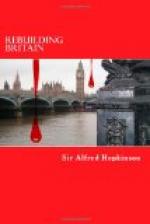Where two high-spirited persons are engaged in a dispute, and each is ready to maintain his cause with the sword, the intervention of a third may save both from the disasters of a battle. The words of the Douglas when intervening in a heated contest, “The first who strikes shall be my foe,” may sometimes be a model for the real peacemaker. But he would certainly have resented the idea of agreeing to keep prepared, ready armed to fight at the bidding of a number of other chiefs, anyone who used force to prevent or punish some injury to himself.
FOOTNOTES:
[Footnote 1: The death of Lord Parker, which occurred soon after these words were written, has deprived the country of the services of one of the few great jurists at a time when they are most sorely needed. There are many good lawyers, many judicial minds acute in seizing the really relevant points in a complicated case, but very few, perhaps none, who united to legal learning and judicial penetration so broad a grasp of principle and appreciation of the larger issues involved in decisions given.]
[Footnote 2: A passage in Mr. Brailsford’s book on a “League of Nations,” published some months before the debate took place, but which I had not seen when the above lines were written, puts the point most forcibly:
“We set out to destroy Prussian militarism. It will be destroyed at the moment when a German Government pledges itself to enter a league based on arbitration and conciliation.”]
CHAPTER IV
LEAGUE OF NATIONS—THE CONDITIONS
After an adjourned debate on June 27th, 1918, in which Lord Curzon pointed out several practical difficulties that would have to be faced, the House of Lords, surely not a body to be carried away by any ephemeral current of popular feeling[3] or captivated by a vague phrase, passed with practical unanimity a resolution in these terms, “That this House approves of the principle of a League of Nations, and commends to His Majesty’s Government a study of the conditions required for its realisation.” It in effect declared the “preamble proved,” and proposed that “the clauses” should be considered. At the suggestion of Lord Bryce—a true friend of peace, if




